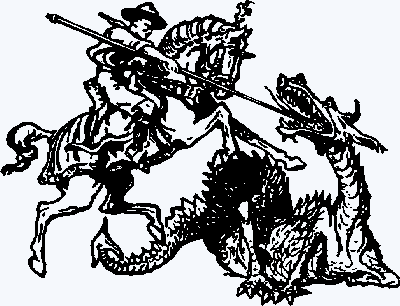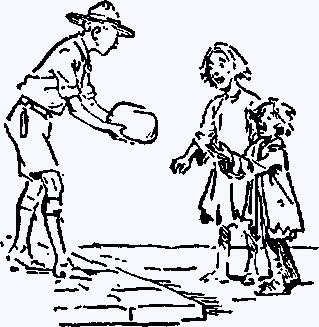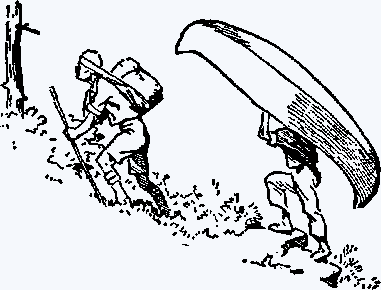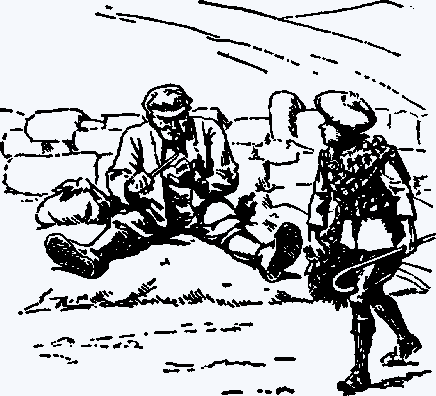Camp Fire Yarn No. 2
WHAT SCOUTS DO
Living in the Open • Woodcraft Chivalry • Saving Life • Endurance Love
of Country
The following things are what you have to know about to become a good Scout:
LIVING IN THE OPEN
Camping is the joyous part of a Scout's life. Living out in God's open air, among the
hills and the trees, and the birds and the beasts, and the sea and the rivers-that is, living with nature, having your own
little canvas home, doing your own cooking and exploration- all this brings health and happiness such as you can never get
among the bricks and smoke of the town.
Hiking, too, where you go farther afield, exploring new places every day, is a glorious
adventure. It strengthens you and hardens you so that you won't mind wind and rain, heat and cold. You take them all as they
come, feeling that sense of fitness that enables you to face any old trouble with a smile, knowing that you will conquer in
the end.
But, of course, to enjoy camping and hiking, you must know how to do it properly.
You have to know how to put up a tent or a hut for yourself; how to lay and light a fire;
how to cook your food; how to tie logs together to make a bridge or a raft; how to find your way by night, as well as by day,
in a strange country, and many other things.
Very few fellows learn these things when they are living in civilised places, because
they have comfortable houses, and soft beds to sleep in. Their food is prepared for them, and when they want to know the way,
they just ask a policeman.
Well, when those fellows try to go scouting or exploring, they find themselves quite helpless.
Take even your sports "hero" and put him down in the wilderness, alongside a fellow trained
in camping, and see which can look after himself. High batting averages are not much good to him there. He is only a "tenderfoot".
WOODCRAFT
Woodcraft is the knowledge of animals and nature.
You learn about different kinds of animals by following their tracks and creeping up to
them so that you can watch them in their natural state and study their habits.
The whole sport of hunting animals lies in the woodcraft of stalking them, not in killing
them. No Scout wilfully kills an animal for the mere sake of killing but only when in want of food-unless it is harmful. By
continually watching animals in the open, one gets to like them too well to shoot them.
Woodcraft includes, besides being able to see the tracks and other small signs, the power
to read their meaning, such as at what pace the animal was going, whether he was frightened or unsuspicious, and so on. It
enables the hunter also to find his way in the jungle or desert. It teaches him which are the best wild fruits and roots for
his own food, or which are favourite food for animals, and, therefore, likely to attract them.
In the same way in inhabited places you read the tracks of men, horses, bicycles, motor
cars, and find out from these what has been going on. You learn to notice, by small signs, such as birds suddenly starting
up, that someone is moving near, though you cannot see him.
By noticing the behaviour or dress of people, and putting this and that together, you
can sometimes see that they are up to no good. Or you can tell when they are in distress and need help or sympathy- and you
can then do what is one of the chief duties of a Scout, namely, help those in distress in any possible way you can.
Remember that it is a disgrace to a Scout, when he is with other people, if they see anything
big or little, near or far, high or low, that he has not already seen for himself.
CHIVALRY
In the old days the Knights were the real Scouts and their rules were very much like the
Scout Law which we have now.
The Knights considered their honour their most sacred possession

They would not do a dishonourable thing, such as telling a lie or stealing. They would
rather die than do it. They were always ready to fight and to be killed in upholding their king, or their religion, or their
honour.
Each Knight had a small following of a squire and some men-at-arms, just as our Patrol
Leader has his Second (or Assistant) and four or five Scouts.
The Code of the Knights
The Knight's patrol used to stick to him through thick and thin, and all carried out the
same idea as their leader-namely: Their honour was sacred.
They were loyal to God, their king, and their country. They were particularly courteous
and polite to all women and children, and weak people.
They were helpful to everybody.
They gave money and food where it was needed, and saved up their money to do so.
They taught themselves the use of arms in order to protect their religion and their country
against enemies.
They kept themselves strong and healthy and active to be able to do these things well.
You Scouts cannot do better than follow the example of the Knights.

One great point about them was that every day they had to do a Good Turn to somebody,
and that is one of our rules.
When you get up in the morning, remember that you have to do a Good Turn for someone during
the day. Tie a knot in your handkerchief or Scout scarf to remind yourself of it.
If you should ever find that you had forgotten to do your daily Good Turn, you must do
two the next day. Remember that by your Scout Promise you are on your honour to do it. But do not think that Scouts
need do only one Good Turn a day. They must do one, but if they can do fifty, so much the better.
A Good Turn need only be a very small one. It is a Good Turn even if it is only putting
a coin into a poor-box, or helping an old woman to cross the street, or making room on a seat for someone, or giving water
to a thirsty horse, or removing a bit of banana skin off the pavement. But one must be done every day, and it only counts
when you do not accept any reward in return.
SAVINS LIFE
The man who saves the life of a fellow-being, as he may do in the sudden appalling accidents
which occur in big cities, mines, and factories, in everyday life, is no less a hero than the soldier who rushes into the
thick of the fight to rescue a comrade amid ail the excitement of battle.
Thousands of Boy Scouts have won medals for life-saving, and I hope that many more will
do the same.
It is certain that many of you will, at one time or another, get a chance to save a life.
But you must BE PREPARED for it. You should know what to do the moment an accident occurs-and do it then and there.
It is not enough to read about it in a book and think that you know what to do. You must
actually practise, and practise often, the things to be done, such as how to cover your mouth and nose with a wet handkerchief
to enable you to breathe in smoke; how to tear a sheet into strips and make a rope for escaping from a fire; how to open a
manhole to let air into a gassy sewer; how to lift and carry an insensible person; how to save and revive apparently drowned
people, and so on.
When you have learned all these things you will have confidence in yourself, so that when
an accident happens and everybody is in a state of fluster, not knowing what to do, you can quietly step out and do the right
thing.
ENDURANCE
To carry out all the duties and work of a Scout, a fellow has to be strong, healthy, and
active. He can make himself so if he takes a little care about it.
It means a lot of exercise, like playing games, running, walking, cycling, and so on.
A Scout should sleep much in the open. A boy who is accustomed to sleep with his window
shut may catch cold when he first tries sleeping out. The thing is always to sleep with your windows open, summer and winter,
and you will not catch cold. Personally I cannot sleep with my window shut or with blinds down, and when I stay in the country
I like to sleep outside the house.
A short go of exercises every morning and evening is a grand thing for keeping you fit-not
so much for making showy muscle as to work all your internal organs, and to work up the circulation of the blood in every
part of you.
Every real Scout takes a bath whenever it is possible. If he cannot get a bath, he takes
a good rub down daily with a wet rough towel.
Scouts breathe through the nose, not through the mouth. In this way they don't get thirsty.
They don't get out of breath so quickly. They don't breathe all sorts of disease germs that are in the air, and they don't
snore at night.
Deep breathing exercises are of great value for developing the lungs, and for putting
fresh air (oxygen) into the blood, provided that they are carried out in the open air, and are not overdone. For deep breathing
the breath must be taken in slowly and deeply through the nose, not through the mouth, till it opens out the ribs to the greatest
extent. Then, after a time, it should be slowly and steadily breathed out again without strain. But the best deep breathing
after all is that which comes naturally from plenty of running exercise.
LOVE YOUR COUNTRY
My country and your country did not grow of itself out of nothing. It was made by men
and women by dint of hard work and hard fighting, often at the sacrifice of their lives-that is, by their whole-hearted patriotism.
In all you do, think of your country first. Don't spend the whole of your time and money
merely to amuse yourself, but think first how you can be of use to the common good. When you have done that, you can
justly and honestly enjoy yourself in your own way

Perhaps you don't see how a mere small boy can be of use to his country, but by becoming
a Scout and carrying out the Scout Law every boy can be of use.
"My country before myself", should be your aim. Probably, if you ask yourself truly, you
will find you have at present got them just the other way about. I hope, if it is so, that you will from this moment put yourself
right and remain so always. Don't be content, like the Romans were, and some people now are, to pay other people to play your
football or to fight your battles for you. Do something yourself to help keep the Flag flying.
If you take up Scouting in that spirit, you will be doing something. Take it up, not merely
because it is good fun, but because by doing so you will be preparing yourself to he a good citizen not only of your country
but of the whole world.
Then you will have in you the truest spirit of patriotism, which every boy ought to have
if he is worth his salt.
THE ELSDON MURDER
A brutal murder took place many years ago in the North of England. The murderer was caught,
convicted, and hanged chiefly through the scoutcraft of a shepherd boy.
Woodcraft-The boy, Robert Hindmarsh, had been up on the moor tending his sheep, and was
finding his way home over a wild out-of-the way part of the hills, when he passed a tramp sitting on the ground with his legs
stretched out in front of him eating some food.
Observation-The boy in passing noticed the tramp's appearance, and especially the peculiar
nails in the soles of his boots.
Concealment-He did not stop and stare, but just took in these details at a glance as he
went by without attracting much attention from the man, who merely regarded him as an ordinary boy.
Deduction-When the boy got near home, some five or six miles away, he came to a crowd
round a cottage. The old woman (Margaret Crozier) who inhabited it had been found murdered. All sorts of guesses were made
about who had done the deed, and suspicion seemed to centre on a small gang of three or four tramps who were going about the
country robbing and threatening death to anyone who made any report of their misdeeds.
The boy heard all these things. Then he noticed some peculiar footprints in the little
garden of the cottage. The nail-marks agreed with those he had seen in the boots of the man on the moor, and he naturally
deduced that the man might have something to do with the murder.
Chivalry-The fact that it was a helpless old woman who had been murdered made the boy's
chivalrous feeling rise against the murderer, whoever he might be.
Pluck and Self-discipline-So, although he knew that the friends of the murderer might
kill him for giving Information he cast his fears aside. He went at once to the constable and told him of the foot-marks in
the garden, and where he could find the man who had made them-if he went immediately.

Health and Strength-The man up on the moor had got so far from the scene of the murder,
unseen, except by the boy, that he thought himself safe, and never thought of the boy being able to walk all the way to the
scene of the murder and then to come back, as he did, with the police. So he took no precautions.
But the boy was a strong, healthy hill-boy, and did the journey rapidly and well, so that
they found the man and captured him without difficulty.
The man was Willie Winter, a gipsy He was tried, found guilty, and hanged at Newcastle.
His body was then brought and hung on a gibbet near the scene of the murder, as was the custom in those days.
Two of the gipsies who were his accomplices were caught with some of the stolen property,
and were also executed at Newcastle.
Kind-heartedness-But when the boy heard of the fate that had befallen Winter, he was overcome
with misery at having caused the death of a fellow creature.
Saving Life-However, the magistrate sent for him and complimented him on the great good
he had done to his fellow countrymen, probably saving some of their lives, by ridding the world of such a dangerous criminal.
Duty-He said: "You have done your duty, although it caused you personally some danger
and much distress. Still, you must not mind that. It was your duty to help the police in getting justice done, and duty must
always be carried out regardless of how much it costs you, even if you have to give up your life."
Example-Thus the boy did every part of the duty of a Boy Scout.
He exercised-Woodcraft; Observation, without being noticed; Deduction; Chivalry; Sense
of Duty; Endurance; Kind-heartedness.
He little thought that the act which he did entirely of his own accord would years afterwards
be held up as an example to you other boys in teaching you to do your duty.
In the same way, you should remember that your acts may be watched by others after
you, and taken as an example, too.
So try to do your duty the right way on all occasions.

